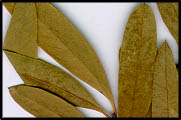South West Slopes Revegetation Guide
Santalum lanceolatum
Northern Sandalwood
Select from the following for detailed images.
Species Information
| Synonyms |
|
| Common Names |
Northern Sandalwood |
| Family |
Santalaceae - Santalum family |
| Name Origin |
Santalum - from Greek santalon, the Sandalwood tree. |
Specimen Data - CSU 2768
| Location |
Near Gundagai, NSW. |
| Notes |
Dry hill above Murrumbidgee River. Identified by the National Herbarium Sydney. |
| Collector |
Stelling, F. |
Date |
01/09/1997 |
| Determined By |
Unknown |
Date |
01/12/1997 |
South West Slopes Revegetation Guide Information
| Regional: |
Noted in the Brungle Bridge-Gundagai area. |
| Australia: |
Qld, NSW, Vic, SA, WA, NT. |
| Habitat: |
Various woodland communities, from sandy sites to rocky hillsides. |
| Habit: |
Much-branched erect shrub 3-7 m high. Bluish-green leaves 3-6 cm long. |
| Similar Species: |
|
| Site Preference: |
|
| Characteristics: |
Parasitises roots of other plants, at least when young. |
| Flowering: |
Throughout year, but mainly Aug-Dec. |
| Seed Collection: |
Collect drupe when dark blue or purple. |
| Propagation: |
From seed. Soak seeds in mild bleach solution for 30 minutes, then wash carefully. Shell can be cracked and removed, or planted whole. Place seeds in plastic bag with moist vermiculite (and fungicide), then secure to make airtight. Keep at 16-250C. Should germinate in about 1 month. Carefully remove when root is about 1 cm long and plant into a pot or into the field. Seedlings require a host plant for at least the first year. |
| Regeneration: |
|
| Timber: |
Emits aromatic scent when burning. |
| Shade and Shelter: |
|
| Land Protection: |
|
| Wildlife: |
Edible sweet drupe eaten by emus. |
| Ornamental: |
Attractive. |
| Other: |
Fruits were eaten. Foliage useful fodder. |
Note: The following information presented is only a guide, as plant characteristics vary depending on provenance (the plant's locality).
| Site/Preferred Habitat : |
sandy sites to rocky hillsides |
| Rainfall(mm) : |
200-500 |
| Growth Rate : |
moderate |
| Tolerates : |
|
| Resents : |
|
| Uses & Comments : |
fodder |
Return to Database List
